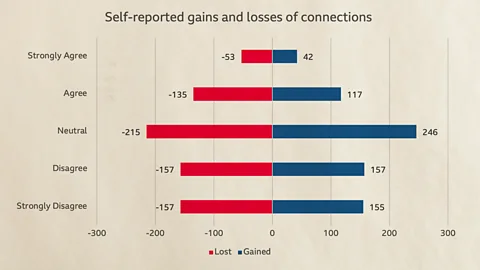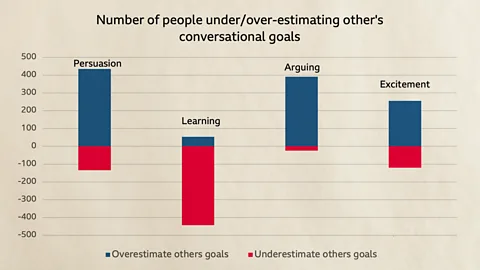The results of a study of BBC.com readers about their friendships suggest there is some cause for optimism amidst the current heated political environment.
As the US election approaches, few would disagree that political and social issues are becoming increasingly polarised. Finding common ground on issues such as the environment, foreign policy and gun control appears to be difficult, according to some research. But what is this doing to people's friendships?
According to the prevailing narrative, the severe differences in worldview are causing our social networks to fracture, resulting in many broken friendships. But is this objectively true? And if so, what psychological factors are most likely to predict the changes to our social networks?
This is what psychologist Ian MacRae and I hoped to explore with our Friendship Study – a short questionnaire offered to BBC.com readers in July and August this year. We were delighted that 1,912 of you participated. For our first analysis, we examined answers from the US and Canada – the primary audience of the BBC international website – with 726 responses from people living in these countries, aged from 19 to 90. We then explored whether the same patterns could be seen in other regions.
First, some caveats: our respondents were limited to people who read BBC.com. Our participants were also self-selecting, meaning that they are not a representative sample of the entire population. Nevertheless, their responses do fit with broader trends noted in the academic research, which suggest that we are often overly pessimistic about other's intentions in social interactions.
On average, our participants did not report finding it harder to talk about politics today than in the past. Many people reported gaining friends, as well as losing them, due to these discussions, suggesting that political engagement can sometimes enhance connection. In line with previous studies, however, we found they overestimated how much others wanted to create an argument over differences in opinion – an assumption that may hamper the free exchange of ideas and potentially stand in the way of forging new friendships.
If you would like to fill in the questionnaire and receive personalised results, before you read a more detailed discussion of our participants' responses, it is available here.
Size and structure of social networks
Our first questions asked participants to describe the general impact of political conversations on their relationships over the past 10 years – by rating a series of statements on a five-point scale from one (strongly disagree) to five (strongly agree).
Surprisingly, the average participant responded fairly neutrally to the statement: "It is harder for me to discuss political issues today, than it was 10 years ago". They were slightly more likely to agree with the statement: "Other people find it harder to discuss political issues today, compared with 10 years ago" but it was a very small difference. Overall, our participants did not consider political disagreement to be a recent phenomenon.
Nor did they appear to have strong views about the overall effects on their social networks. On average, they were just as likely to agree with the statement "my conversations about political issues have caused me to gain social connections" as they were to agree with the statement "my conversations about political issues have caused me to lose social connections". Overall, their perceived gains and losses were almost exactly equal. We don't know the exact nature of these changes, but it is plausible that people are breaking some ties with the people of opposing views, and then building new friendships with those that have similar opinions.
 BBC/ Ian MacRae
BBC/ Ian MacRaeThe overall trend, however, might seem surprising in a world that is portrayed as being rift by increasingly polarised perspectives. Certainly, there is evidence in the academic research that who you choose to be friends with can affect the strength of the views you hold – hang out only with people who hold the same views as you and those opinions will likely become more radical and entrenched. The effect is often seen within online social media networks, where political homophily can create echo-chambers that amplify people's ideologies. But there is just also considerable evidence that regularly talking to, or engaging with, people who hold different views from yourself can help to lessen polarisation of opinions.
Many of our participants reported that they were willing to connect across the aisle. Just 32% of the US and Canadian participants agreed with the statement "it is important to me that others share my political views", while others were either neutral (25%) or disagreed (43%).
It would be interesting to see if this variety of opinion is unique to our self-selecting group of participants. Many media articles have described people's experiences of losing friendships due to ideological differences, but our participants' answers to our questionnaire suggest it may make more sense to look at the general changeability of people's social networks – the movement of people both in and out of our friendship groups.
We can't be certain about the direction of causality here. These people may have decided to conceal their opinions as a reaction to some difficult exchanges that had broken their bonds with loved ones. It is also possible, however, that the reverse is true: the secrecy about their true opinions has harmed their relationships. We know, after all, that honesty is highly valued by others and can contribute to deeper and more authentic bonds. Disguising their true beliefs may have been socially isolating.
 BBC/ Getty Images
BBC/ Getty ImagesConversational goals
We next examined people's goals in their conversations around politics: what did they hope to achieve, and what did they believe that others hoped to achieve when talking about politics with someone from "across the aisle"?
While writing my book The Laws of Connection, I discovered research showing that our assumptions about other people's intentions are often wildly misplaced. These misperceptions can shape our subsequent interactions.
For example, Hanne Collins, an assistant professor of management and organisations at the University of California, Los Angeles, and her colleagues recently asked participants to imagine having a five-minute conversation with someone they disagreed with about politics or sports. They first had to rate how important, on a scale of one (not at all) to five (extremely), each of the following goals would be for them in the conversation:
- Learning about your partner's perspective
- Understanding your partner's point of view
- Hearing evidence for your partner's beliefs
And
- Persuading your partner of your point of view
- Convincing your partner that you are right
- Presenting evidence for your point of view
After answering for themselves, the participants had to guess how important each of those goals would be for their conversation partner, using the same scale.
Collins and her team found stark differences in participants' perceptions of themselves and others. Compared to their own ratings, they tended to overestimate how much other people would want to persuade them to change their mind. They would also underestimate how much other people would want to discover and understand their point of view. In other words, people say they are willing to learn themselves, but don't believe others have the same goal, says Collins.
We saw the same perception gap in our sample. Participants believed that learning about an alternative viewpoint would be less important to other people, compared to themselves – with average scores of 2.98 and 3.97 on the five-point scale. They rated persuasion, in contrast, as being more important to others than themselves – at 3.30 compared to 2.77 on the five-point scale.
Collins is positive about the results. "It's always exciting to see your results replicate –especially with such amazing samples of respondents and with large effect sizes," she says.
The impact this has on our social interactions is important. Collins's experiments suggest that these perception gaps may create more hostile attitudes towards conversation partners. When we believe that someone lacks a genuine interest in learning about our beliefs, we tend to become more defensive and less open-minded, she says. We also tend to evaluate them as being less moral and trustworthy. None of which would set the stage for a constructive interaction.
The reverse is true when people believe that learning is a higher priority for the other person. "Even when we keep the arguments constant – people who believe the same argument was written by someone with high learning goals will evaluate it more positively," says Collins.
Our data suggest that people's perceptions of those conversational goals may be affecting the structure of their social circles. The stronger people's intentions for both persuasion and learning, the lower the stability of their networks, with greater numbers of losses and gains.
 BBC/ Ian MacRae
BBC/ Ian MacRaeIn our study, we also considered a purely antisocial intention, asking participants to rate how important it would be to "start an argument" between themselves and someone they were talking to. As you might hope, most people rated this as being a very low priority for themselves, but they tended to overestimate how important it would be for others. In total, around 54% of the participants experienced this "perception gap", which could reduce the chances of having an honest and friendly discussion. Just 3% underestimated other's inclination to argue.
Global patterns
How do these patterns vary by country? The results described so far are based on responses from the US and Canada. Our global pool included nearly 2,000 participants – a large sample by the standard of most psychological experiments, although worth remembering it is limited to people who are readers of BBC.com. When we expanded our analyses to include this data, we did not see any major differences in people's perceptions or behaviour. The only statistically significant difference concerned the question of whether it was harder to discuss politics now, compared with 10 years ago: participants from the rest of the world were slightly less likely to endorse this view than those in North America.
We also didn't see any significant gender differences, besides the fact that men report being more willing to discuss controversial topics than women.
When taken together, our study, combined with the existing academic literature, might offer some grounds for optimism about the state of social connection in the 21th Century. In our sample, at least, many people were willing to connect across the political divide. We are often needlessly cynical about other's wishes to understand us, when they may be just as concerned as we are to have a respectful exchange of opinions.
As I shall explore in our next article, we can make the most of this fact by learning evidence-based strategies that encourage more open and honest discussions over polarised topics.
* David Robson is an award-winning science writer and author of The Laws of Connection, which examines 13 science-based strategies to transform your social life, published by Canongate (UK & Commonwealth)/Pegasus (US and Canada). He is @d_a_robson on X and @davidarobson on Instagram and Threads.
** The Friendship Study was created with Ian MacRae, a psychologist, independent researcher and author of books about personality, leadership and the psychology of technology. His books include: Dark Social, High Potential and Web of Value. He is @IanSMacRae on X and LinkedIn.--
If you liked this story, sign up for The Essential List newsletter – a handpicked selection of features, videos and can't-miss news, delivered to your inbox twice a week.

.jfif)
Post a Comment